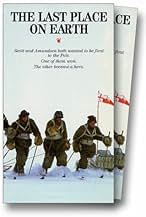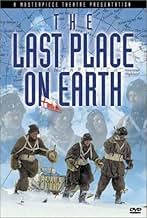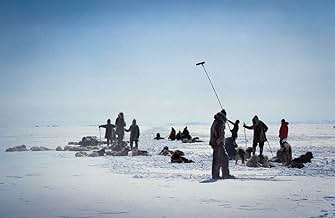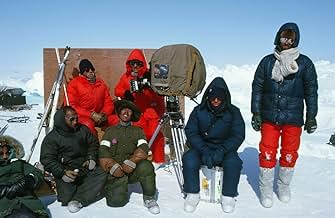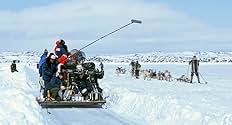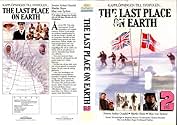Ajouter une intrigue dans votre langueBased on the book 'Scott and Amundsen' by Roland Huntford, "The Last Place on Earth" is an exploration of the rivalry between Captain Robert F. Scott and Ronald Amundsen as they attempt to r... Tout lireBased on the book 'Scott and Amundsen' by Roland Huntford, "The Last Place on Earth" is an exploration of the rivalry between Captain Robert F. Scott and Ronald Amundsen as they attempt to reach the South Pole.Based on the book 'Scott and Amundsen' by Roland Huntford, "The Last Place on Earth" is an exploration of the rivalry between Captain Robert F. Scott and Ronald Amundsen as they attempt to reach the South Pole.
Parcourir les épisodes
Avis à la une
10JANA-7
Roland Huntford's meticulous and exhaustive research of Scott and Amudsen's Antarctic exploration efforts for winning the South Pole help make the making of this film a Directors dream and challenge. Outstanding cinematography and period costume design push this great story to the highest level of viewing. The film should be mandatory viewing for all highschoolers. The historical and geographical values will enhance ones knowledge of this very special period of Antarctic exploration in the early 1900s. The British and Norwegian actors perform their skills with convincing emotion. The film, based on Huntford's documentary brilliance, gives us all time to ponder what really happened in claiming the South Pole and lays to rest a good deal of sentimental nonsense,which some of us were subjected to during our high school days.
Let me start out by agreeing with everyone who has previously written: it is the best drama about polar adventure ever made.
The viewer should be very skeptical about the Scott defenders because it is evident their homework is shallowly researched and based on a very limited interpretation of Scott's polar problem: that bad luck and bad weather caused his downfall.
I've read Huntford's book 3 times, read the weather article and seen the PBS episode where the young scientist tried to resurrect Scott as a noble, if unfortunate hero. Also, Huntford and his fellow professionals have posted excellent rebuttals regarding these spurious claims about Scott and the weather.
The questions that should put an end to the argument is this: who would get you through safely and who exhibited a breadth of polar knowledge sufficient to AVOID the problems of travel in the brutal Antarctic?
If you said Scott, then you probably thought the Charge of the Light Brigade was a wonderful jaunt through Russian cannon fire just to show how noble and brave you were. Above all else, don't let these half-informed reviewers go without a serious look into the counter-points made to their weak arguments.
Still, the series is a breath-taking look at the human struggle to survive and to seek glory and the dreadful price it takes in lives and in the judgment of history.
The viewer should be very skeptical about the Scott defenders because it is evident their homework is shallowly researched and based on a very limited interpretation of Scott's polar problem: that bad luck and bad weather caused his downfall.
I've read Huntford's book 3 times, read the weather article and seen the PBS episode where the young scientist tried to resurrect Scott as a noble, if unfortunate hero. Also, Huntford and his fellow professionals have posted excellent rebuttals regarding these spurious claims about Scott and the weather.
The questions that should put an end to the argument is this: who would get you through safely and who exhibited a breadth of polar knowledge sufficient to AVOID the problems of travel in the brutal Antarctic?
If you said Scott, then you probably thought the Charge of the Light Brigade was a wonderful jaunt through Russian cannon fire just to show how noble and brave you were. Above all else, don't let these half-informed reviewers go without a serious look into the counter-points made to their weak arguments.
Still, the series is a breath-taking look at the human struggle to survive and to seek glory and the dreadful price it takes in lives and in the judgment of history.
10Rosabel
This series was a great revelation to me: I'd heard of "Scott of the Antarctic" but never of Roald Amundsen, the man who beat Scott to the South Pole. It is a fine adaptation of the book by Roland Huntford, and does a great job of poking a hole in the romantic illusion that this adventure was some landmark episode of English heroism. It is instead an illustration of a truth that no one at the time could admit: that by 1912 "Britain was forgetting how to think", and too long a period at the top as the world's pre-eminent power had bred arrogance, inflexibility and an inability to learn. The contrast between the pompous incompetence of the British and the intelligence and adaptability of the underdog Norwegians is highlighted throughout the series. As Amundsen says in the first episode, "Experience teaches them only one thing: that they are British, and therefore pre-eminent. But Nature is deaf to such things; she cannot hear the tunes of glory." Even to a person who does not already know the historical outcome of this story, the British from the beginning seem to be marching to their doom. The whole expedition, despite the money and materiel lavished upon it, is a story of shoddiness, second-rate decision-making, and slovenly improvisation. The blame for most of this is laid squarely upon Scott himself, who is shown as a thoroughly mediocre leader. Martin Shaw gives a wonderful performance as Scott, and even manages the considerable feat of creating some sympathy for this stupid man, pushed out of his depth and driven by ambition to attempt something he is incapable of achieving. There was some outrage, especially in Britain, both at the book and the series, which were seen as unfairly kicking Scott, who had at least paid with his life for any mistakes he might have made. The makers of this series are to be complimented for not yielding to such sentimentality. They never let us forget that 4 other men died with Scott as a result of his stupidity, and the horror of their slow death by starvation, scurvy, exposure and infection is presented unflinchingly. The end of the series gives us a cynical scene with Scott's widow and the responsible officers of the Admiralty busy concocting the myth of "Scott of the Antarctic" which was to beguile the public until Huntford's book came along to shine the light of truth into this corner of history. Hopefully, as a result of the book and the series, there can be no going back to the comfortable lies of the past.
So, here we go again - Scott had it harder than Amundsen, Amundsen was simply doing a "stunt", and so Scott was the more "noble".
If you compare their diaries (and you can now, as Huntford did), Scott stayed in his tent on days when Amundsen and his crew did their fifteen miles (they did fifteen miles a day unless they were completely blizzard-bound - some days in their fur underwear and nothing else). And they had the same weather on nearly the same days. Scott started later, since his teams couldn't travel when it was really cold, so he was out on the land-mass later than Amundsen by nearly a month (which is why he encountered colder temperatures). Scott assumed that changing his headcount from four to five men at the last minute would make no difference in the food supply when they'd very carefully planned exactly how much food they'd need for a four-man team, with no contingency for delays. Amundsen ensured that he'd have at least double the amount of food and fuel he'd need for the whole trip.
As to dogs and ponies - Scott didn't like dogs, because he didn't understand them, either how to work with them, nor how to drive them. The first time he saw dogs being driven properly was on the barrier by Cecil Meares. The scenes where Meares drives past them, and is later found relaxing, waiting for the rest of the teams to arrive are taken verbatim from Scott's and Meares' diaries. Ponies are NOT appropriate for the Antarctic environment, since they have to pull their own food for every mile they're going to walk. Dogs could eat seal and penguin, both of which are native to the Antarctic; they could also eat each other, if necessary.
Amundsen had to trail-blaze an entirely new route, through and over some of the most difficult terrain the Antarctic has to offer. Scott had a map of his route up to the last ninety-seven miles. The Beardmore glacier (Scott's route) is a nice, long, slow climb to the Pole. The Axel Heiberg glacier requires planes flying over it to use their maximum rate of climb; Amundsen and his crew pioneered a route through the ice falls of the Heiberg in less than a week.
And yes, there was a conspiracy to tart up Scott's diaries for public consumption. Scott's widow, Kathleen, worked with J.M. Barrie (of Peter Pan fame) to edit his diaries, making him more of a heroic figure, and cutting out the more disparaging comments Scott made about his companions.
Planning is everything: Scott and his companions died of starvation and scurvy; Amundsen and his crew gained weight on their trip.
I'm not saying that Scott wasn't a brave fellow or that his journey was less than that of Amundsen. I can't imagine man-hauling a 300 lb sledge for hundreds of miles. The tragedy of Scott is that, had he done his research (as Amundsen had), he wouldn't have had to, and he might have beat Amundsen to the pole.
If you compare their diaries (and you can now, as Huntford did), Scott stayed in his tent on days when Amundsen and his crew did their fifteen miles (they did fifteen miles a day unless they were completely blizzard-bound - some days in their fur underwear and nothing else). And they had the same weather on nearly the same days. Scott started later, since his teams couldn't travel when it was really cold, so he was out on the land-mass later than Amundsen by nearly a month (which is why he encountered colder temperatures). Scott assumed that changing his headcount from four to five men at the last minute would make no difference in the food supply when they'd very carefully planned exactly how much food they'd need for a four-man team, with no contingency for delays. Amundsen ensured that he'd have at least double the amount of food and fuel he'd need for the whole trip.
As to dogs and ponies - Scott didn't like dogs, because he didn't understand them, either how to work with them, nor how to drive them. The first time he saw dogs being driven properly was on the barrier by Cecil Meares. The scenes where Meares drives past them, and is later found relaxing, waiting for the rest of the teams to arrive are taken verbatim from Scott's and Meares' diaries. Ponies are NOT appropriate for the Antarctic environment, since they have to pull their own food for every mile they're going to walk. Dogs could eat seal and penguin, both of which are native to the Antarctic; they could also eat each other, if necessary.
Amundsen had to trail-blaze an entirely new route, through and over some of the most difficult terrain the Antarctic has to offer. Scott had a map of his route up to the last ninety-seven miles. The Beardmore glacier (Scott's route) is a nice, long, slow climb to the Pole. The Axel Heiberg glacier requires planes flying over it to use their maximum rate of climb; Amundsen and his crew pioneered a route through the ice falls of the Heiberg in less than a week.
And yes, there was a conspiracy to tart up Scott's diaries for public consumption. Scott's widow, Kathleen, worked with J.M. Barrie (of Peter Pan fame) to edit his diaries, making him more of a heroic figure, and cutting out the more disparaging comments Scott made about his companions.
Planning is everything: Scott and his companions died of starvation and scurvy; Amundsen and his crew gained weight on their trip.
I'm not saying that Scott wasn't a brave fellow or that his journey was less than that of Amundsen. I can't imagine man-hauling a 300 lb sledge for hundreds of miles. The tragedy of Scott is that, had he done his research (as Amundsen had), he wouldn't have had to, and he might have beat Amundsen to the pole.
Roland Huntford's definitive saga of polar exploration, "Scott and Amundsen", is brought very faithfully to film in this 7-episode BBC series. Huntford was the former Scandinavian correspondent for London's "Observer", and his book was the first to debunk Scott's supposed heroic martyrdom.
Beautiful cinematography and several very solid performances by Sverre Anker Ousdal as the introspective and driven Amundsen; Martin Shaw nails the effete martinet, Scott; Michael Maloney is great as Scott's betrayed 2nd Officer, Teddy Evans; Toralv Maurstad as the outspoken Norwegian polar veteran, Hjalmer Johanssen; and, Richard Morant as, W.E.G. Oates, the army officer in a Navy environment and apparently the only man in Scott's party capable of independent thought.
Beautiful cinematography and several very solid performances by Sverre Anker Ousdal as the introspective and driven Amundsen; Martin Shaw nails the effete martinet, Scott; Michael Maloney is great as Scott's betrayed 2nd Officer, Teddy Evans; Toralv Maurstad as the outspoken Norwegian polar veteran, Hjalmer Johanssen; and, Richard Morant as, W.E.G. Oates, the army officer in a Navy environment and apparently the only man in Scott's party capable of independent thought.
Le saviez-vous
- AnecdotesDirector Ferdinand Fairfax had previously worked with Martin Shaw on the TV series The Professionals (1977-81). Whilst he was unimpressed with Lewis Collins ego on that show, he was impressed by Shaw's acting range and desire to be offered more challenging material. So when he was asked to direct this miniseries he successfully lobbied the producers (who were considering Timothy Dalton among others) to meet Shaw. They too liked him and he was eventually offered the lead role.
- GaffesOn his return from the South Pole at 'Framheim,' Amundsen learns that the credit for reaching the North Pole has been taken away from Dr Frederick Cook and given instead to Peary. In reality, Amundsen was well aware of the controversy *before* his departure for Antarctica, and to avoid any question that he had not reached the true South Pole due to faulty navigation, staked out an area of ten miles around what he believed to be the Pole itself.
Meilleurs choix
Connectez-vous pour évaluer et suivre la liste de favoris afin de recevoir des recommandations personnalisées
- How many seasons does The Last Place on Earth have?Alimenté par Alexa
Détails
Contribuer à cette page
Suggérer une modification ou ajouter du contenu manquant

Lacune principale
By what name was The Last Place on Earth (1985) officially released in India in English?
Répondre
